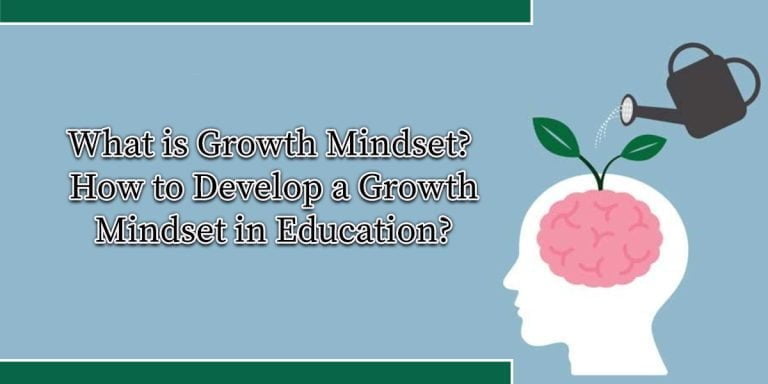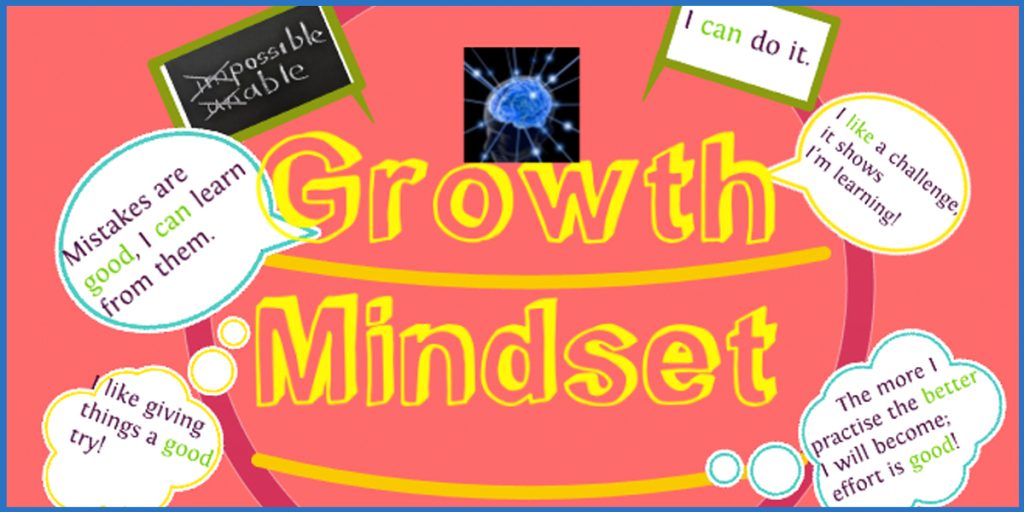This article will focus on how to develop a Growth Mindset in education. This is a belief that abilities, talents, and intelligence can be acquired through dedication and hard work. It encourages individuals to embrace challenges and learn from mistakes instead of viewing them as obstacles or failures. With a growth mindset, learners strive to develop their skills and knowledge, not just to achieve success or recognition.
What is Growth Mindset?
A growth mindset is a psychological concept that emphasizes an individual’s belief in their ability to improve and develop through hard work, dedication, and persistence. It is based on the idea that intelligence can be developed over time regardless of how smart or talented someone may already be. It encourages individuals to take risks, try new things, and push themselves to reach their full potential. A growth mindset rejects the idea that intelligence is a fixed trait and instead promotes the belief that it can be developed through practice, effort, and dedication.
10 Ways to Develop a Growth Mindset in Education
Developing a growth mindset in education starts with creating an environment that encourages learning and improvement. This means fostering collaboration, meaningful feedback, and purposeful challenges. It also teaches students to find value in mistakes, take risks and be open-minded to new ideas. By doing so, learners will become more resilient and capable of taking on challenges.
Here are the 10 best ways to develop a growth mindset in education.
1- Create a Growth Mindset Culture
Creating this culture in education is essential for the development of students. This culture emphasizes that effort, improvement, and hard work lead to success, not an innate ability or talent. It encourages students to take risks, persist when faced with failure, learn from mistakes, and strive for improvement rather than perfection. To foster a growth mindset culture, teachers can incorporate activities that promote effort and learning from mistakes, such as providing feedback to students on areas of improvement or creating classroom challenges. It is also essential for teachers to talk positively about the learning process and emphasize the importance of making mistakes to grow and become more successful.
2- Promote Collaborative Learning
Collaborative learning is an effective way to promote a mindset in education. Encouraging students to work together and collaborate on projects provides an environment for them to learn from each other, share ideas and solutions, and build positive relationships with their peers. Collaborative learning also helps students to develop essential skills such as communication, problem-solving, and critical thinking. Furthermore, it provides an opportunity to instill a growth mindset in students by allowing them to take ownership of their learning experience, be open-minded and flexible, and challenge themselves. By providing collaborative activities that involve discussion, debate, and feedback from teachers and peers, students can learn how to think creatively and acquire the skill of constructive criticism, which can help them develop a growth mindset.
3- Provide Encouragement & Support
Providing encouragement and support is essential to helping students develop growth mindset. For example, teachers need to provide positive feedback, such as recognizing the effort put into an assignment and praising a student’s progress. Additionally, teachers should be mindful to avoid labeling students with fixed mindsets or discouraging statements that might cause them to give up. Instead, educators need to focus on the process of learning by emphasizing the importance of resilience. Teachers can also offer opportunities to learn from mistakes by providing chances for collaboration, problem-solving and constructive feedback.
4- Emphasize Persistence
It is important to emphasize to students that they must continue trying and not give up when faced with an obstacle or challenge. Encouraging persistence will help them develop a resilient attitude toward learning and motivate them to keep pushing despite challenges. This can be done through various activities, such as setting small, achievable goals that can gradually be built upon and providing feedback to students on their progress. Additionally, teachers should give recognition for the effort put in by students and not just focus on grades as a measure of success. By emphasizing persistence and resilience, we can help students develop a growth mindset that will benefit them in their future education endeavors.
5- Model a Growth Mindset
When educators demonstrate a passion for learning, share their own mistakes and successes, and encourage students’ educational efforts, a growth mindset can be nurtured and cultivated. Educators should also provide opportunities for students to self-reflect on their progress and set goals for their learning journey. To reinforce the idea of progress over perfection, educators should introduce exciting topics to discuss with their peers and provide an open platform for students to express their ideas and experiences. This will help them to understand that failure is a part of the learning process and there are always opportunities for growth and improvement.
6- Develop Self-Awareness
Self-awareness involves:
- Taking a step back.
- Reflecting on our thoughts, behaviors, and achievements.
- Understanding how they influence our beliefs about ourselves.
By developing a greater understanding of ourselves, we can start to identify the mindsets impacting our thinking, allowing us to recognize potential growth areas. This insight can help us replace unhelpful attitudes with more positive and encouraging ones, enabling a greater level of self-efficacy, which is essential for embracing the challenge of learning.
Self-awareness also allows us to celebrate our successes more fully, creating a valuable sense of accomplishment that will motivate us to continue our growth journey.
7- Make Learning Fun
When students see learning as an enjoyable experience, they are more likely to take risks, challenge themselves, and persist in complex tasks.
Teachers can make learning fun by offering engaging activities, providing positive feedback and incentives, and celebrating successes. Incorporating games into the curriculum has also effectively created a fun learning environment. By turning challenging concepts into exciting activities, students are more likely to be motivated to pursue their goals and develop a growth mindset.
Furthermore, by modeling curiosity and enthusiasm, teachers can encourage students to develop a “can do” attitude towards learning. When learners are engaged in exciting activities and set tangible goals, they are more likely to build skills that lead to success.
8- Develop Resilience
It involves the ability to recover quickly and effectively from challenging situations, as well as the ability to tolerate stress and uncertainty without becoming overwhelmed. Resilience can be developed through healthy coping strategies, such as problem-solving, positive self-talk, and seeking help from others. By doing so, students can gain confidence to persevere when things get tough and continue to strive towards their goals, even when they face difficulty. Additionally, resilience helps students to accept failure as part of the learning process, recognize that mistakes are growth opportunities, and use feedback constructively. Building resilience can help students become more adaptable to change and develop a sense of self-efficacy or belief in their abilities.
9- Celebrate Achievements
By recognizing and rewarding students for their accomplishments, schools can create an environment that encourages further learning and effort. Through shared recognition of achievements, teachers can help foster student motivation and resilience in the face of setbacks or difficulties. Celebrating successes is also a powerful way to build positive relationships between educators and students by showing appreciation for their hard work and progress. Additionally, celebrating success gives students a sense of belonging and ownership within the school community. This helps to create a feeling of communal support, which is key for cultivating a growth mindset in education.
10- Highlight Improvement
Improving and developing skills is essential to cultivating a growth mindset, so it is important to highlight the improvement in learning. Celebrating successes and small wins helps to motivate learners to take risks and build confidence in their abilities. Creating a safe and supportive environment for students can also help them feel comfortable taking risks as they work towards their goals. It is also essential to encourage learners to reflect on their work, identify areas for improvement and develop strategies for reaching their goals. Doing this helps build resilience as students learn to effectively take on challenges and adapt when things don’t go as planned.
Final Thoughts
learners to strive for excellence, be open to new ideas and experiences, and become more resilient in the face of setbacks. Educators play an essential role in helping to foster and promote a growth mindset by providing positive reinforcement, allowing students to make mistakes, and setting achievable goals. Through these strategies, educators can help their students build strong learning foundations that will serve them well both now and in the future.


